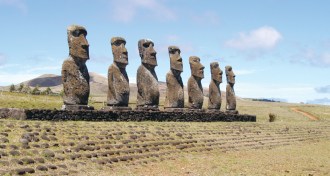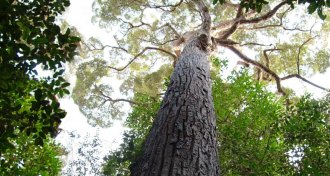Search Results for: Forests
Skip to resultsCan’t find what you’re looking for? Visit our FAQ page.
5,531 results for: Forests
-
 Health & Medicine
Health & MedicineCalcium clue
Excess calcium in the blood might signal an increased risk of fatal prostate cancer, a new study finds.
By Nathan Seppa -
 Life
LifeBirds duet to fight and seek
The first study to track birds in the forest via microphone arrays shows that birds double up on fight songs, or play Marco Polo in tropical shrubbery.
By Susan Milius -
 Life
LifeBeetles grow weed killer
Beetle moms carry their own bacteria for making a compound to protect their gardens.
By Susan Milius -
 Space
SpaceNo naked black holes
In a simulated merger, astrophysicists tried to push the boundaries of two black holes into shedding their event horizons. But the resulting black hole was still shrouded by its event horizon, through which even light can’t escape.
-
 Earth
EarthWhen trees grew in Antarctica
Fossils of trees that grew in Antarctica millions of years ago suggest a growth pattern much different than modern trees.
By Sid Perkins -
 Earth
EarthLake Superior’s ups and downs
Analyses of trees and other organic material buried in a riverbank near Lake Superior’s northwestern shore shed new light on how much and when the lake level varied soon after the last ice age.
By Sid Perkins -
 Life
LifeYear in Review: Bioengineers make headway on human body parts
New techniques produce mimics of brain, liver, heart, kidney, retina.
By Meghan Rosen -
 Humans
HumansLetters from the January 7, 2006, issue of Science News
Death in the Americas I was wondering if researchers have given any thought to the idea that in the same way that disease devastated human populations after the European discovery of the Americas, perhaps disease was a contributing factor in the demise of much of the fauna of the Western Hemisphere (“Caribbean Extinctions: Climate change […]
By Science News -
 Archaeology
ArchaeologyEaster Island’s farmers cultivated social resilience, not collapse
A Polynesian society often presumed to have self-destructed shows signs of having carried on instead.
By Bruce Bower -
 Microbes
MicrobesThe vast virome
When it comes to the microbiome, bacteria get all the press. But virologists are starting to realize that their subjects also do a lot more than make people sick.
-
 Climate
ClimateMangroves move up Florida’s coast
Satellite images reveal that the tropical trees are expanding north up Florida’s Atlantic coast, taking advantage of rising winter temperatures.
-
 Ecosystems
EcosystemsTrees’ growth keeps climbing with age
Older trees pack on weight faster, making them potentially the best carbon collectors.
By Meghan Rosen